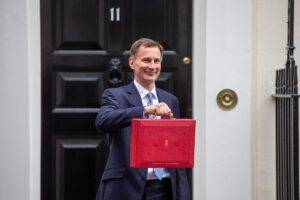The Conservative Party is weighing the option of implementing a stamp duty cut ahead of the general election through the autumn statement, aiming to woo voters with a pre-election offer.
The proposed measure involves raising the stamp duty threshold from £250,000 to £300,000, potentially resulting in significant tax savings for homebuyers and injecting momentum into the housing market.
The Treasury has drafted plans for the stamp duty cut, estimating an annual cost of £3 billion by 2028-29. Nearly half of all homebuyers could benefit from the change, potentially saving up to £2,500 on their property purchases. While the proposal was considered for the spring budget, it was shelved in favour of national insurance cuts.
However, with inflation expected to decrease significantly by the time of the autumn statement, senior Tories are revisiting the idea of a stamp duty cut as part of a pre-election strategy. Chancellor Jeremy Hunt has initiated preliminary discussions with senior officials regarding the autumn statement, anticipated in September, with Prime Minister Rishi Sunak aiming to hold a general election in November.
Last year, Hunt and Sunak implemented national insurance cuts totaling 4p, amounting to £900 for the average worker, but these cuts failed to substantially impact polling figures. Despite this, ministers are contemplating further national insurance and stamp duty cuts if fiscal conditions allow. Michael Gove, the levelling-up secretary, has advocated for bold housing initiatives, including stamp duty cuts and increased support for first-time buyers, to win over voters.
Currently, individuals start paying stamp duty at 5% on property values exceeding £250,000, with higher rates for more expensive properties. The proposed stamp duty cut would particularly benefit regions with higher property prices, such as the south of England.
Discussions regarding the timing of the autumn statement are ongoing, with Sunak reportedly preferring a November election to allow more time for economic recovery. However, there is speculation that an early election could be called in June or July, especially if there is dissent within the Conservative Party following the local elections in May.
In addition to fiscal measures, Sunak has announced welfare reforms aimed at addressing the sustainability of disability benefit payments and incentivizing employment. The proposed reforms aim to overhaul the welfare system’s approach to mental health and discourage long-term unemployment.
The Prime Minister is optimistic about passing the government’s Safety of Rwanda Bill, despite delays caused by opposition in the House of Lords. The bill seeks to establish arrangements for transferring migrants to Rwanda, with the first flights potentially scheduled for June.
Read more:
Tories Mull Stamp Duty Cut Ahead of General Election in Autumn Statement

